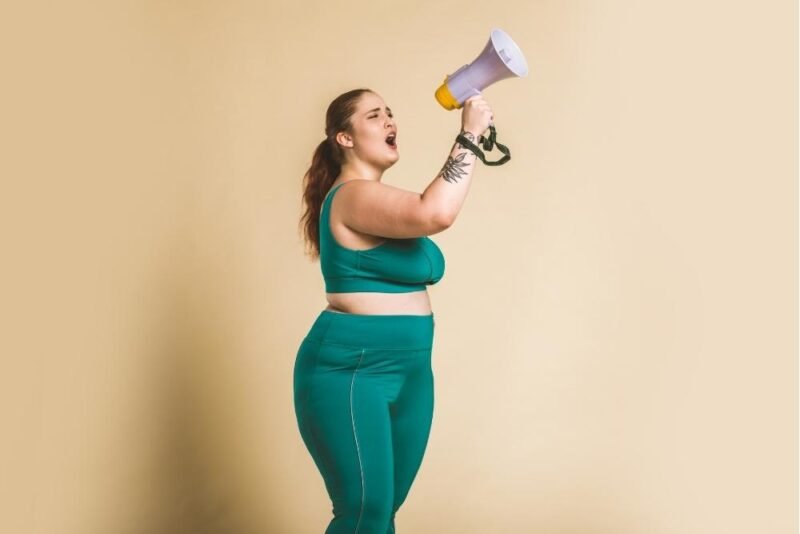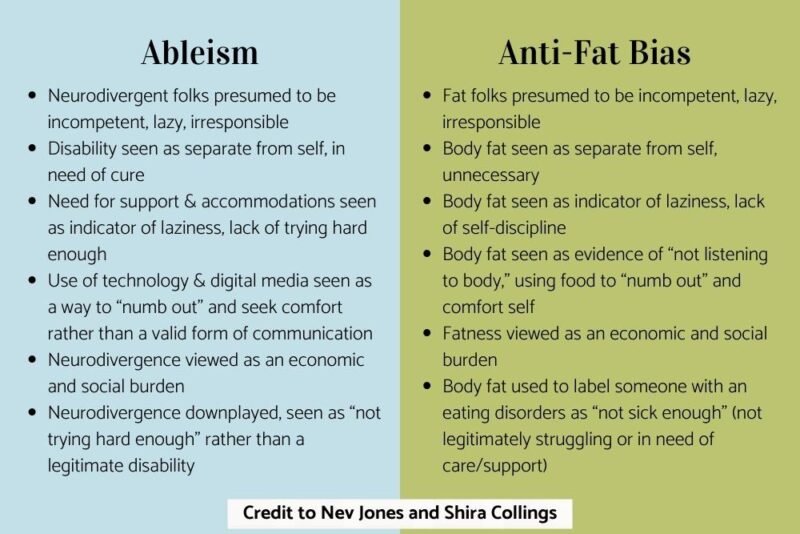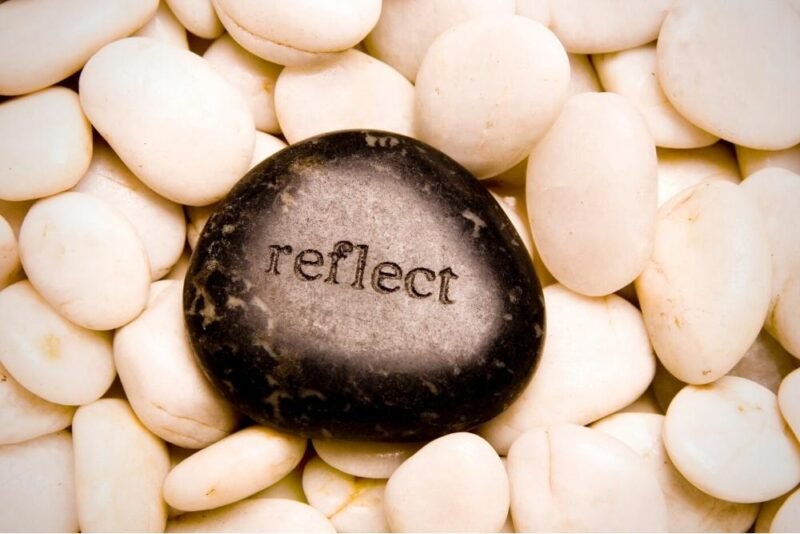
The subject matter of this site article is one particular I only began to explore myself in the previous year or so. I was shocked, at very first, when it sunk in how ableist diet program culture is, with healthism and anti-fatness/sizeism as the backlinks. I recognized how ablest (and healthist) my own imagining was back again when I was deeply enmeshed in eating plan tradition, myself. And now that I see this darker aspect of diet regime tradition, I cannot unsee it, and I want you to see it, too.
Diet plan lifestyle is just 1 of lots of social programs in which men and women are addressed inequitably. It often overlaps not just with ableism, sizeism and healthism, but also with racism, sexism, ageism and classism.
Food plan lifestyle supports interpretations of personalized health choices as ethical character — it is not just about pounds loss. Diet program tradition does not assist the value of all bodies, and diet plan society does not exist in a vacuum.
Even if you do not take into account yourself to be on a “diet,” mainly because you stay inside food plan society, you will nonetheless have ideas, beliefs and behaviors — aware or unconscious — that have been strongly influenced by diet plan society. Unless you do the operate to free of charge oneself, of system.
Intently associated to eating plan lifestyle is conditioning culture, which, not amazingly, is also healthist and ableist, sending delicate or not-so-refined messages that exercising need to be utilized to “overcome” or steer clear of incapacity, due to the fact disabled bodies have a lot less worth.

What is “disability”? What is “ableism”?
So, what do I indicate when I say “disabled”? I’m not only talking about needing to use a wheelchair, a walker, a cane or other mobility assistance units. Disabilities can be noticeable, or not obvious. Somebody with a wellness affliction that influences their strength, endurance or mobility would be disabled, and that may possibly not be totally noticeable. Or, another person could be neurodivergent, which frequently is invisible.
“Neurodivergent” is expression for persons with cognitive and/or neurological procedures that differ from what is considered — by cultural/societal and medical criteria — to be “typical” or “normal.” This features people today with autism, ADHD, stress and anxiety, despair and borderline temperament, as very well as men and women who are remarkably delicate to sensory stimulation.
I observed this definition by attorney and social justice activist Talila “TL” Lewis to be comprehensive and powerful:
“A technique of assigning benefit to people’s bodies and minds dependent on societally constructed ideas of normalcy, productivity, desirability, intelligence, excellence, and health and fitness. These built suggestions are deeply rooted in eugenics, anti-Blackness, misogyny, colonialism, imperialism and capitalism.
“This systemic oppression leads to men and women and society pinpointing people’s price based mostly on their culture, age, language, look, religion, birth or living location, “health/wellness,” and/or their capacity to satisfactorily re/develop, “excel” and ‘behave.’
“You do not have to be disabled to experience ableism.”
What ablism and anti-fatness/sizeism have in common is the great — held by the professional medical technique and society at massive — that currently being extra fat and becoming disabled are the two abnormalities that the particular person must work difficult to triumph over. Also, that obtaining a human body that is abnormal in this way indicates that you are not typical, and not fairly human. [Note that I use the word “fat” as a neutral descriptor, like short or tall.]
Which is total and utter bullsh*t.

A very first glimpse at ableism and anti-fats bias
Just as you really don’t have to be disabled to encounter ableism, you don’t have to be body fat to expertise anti-fat bias. If you are a slender particular person who diet plans or workouts to remain thin, it is at the very least in aspect simply because you are afraid of becoming excess fat. It may perhaps also because you are concerned of starting to be “unhealthy” or encountering a decline of mobility.
I’ve experienced shoppers in much larger bodies who also transpire to have some mobility issues inform me how important it was for them to test to walk or go “normally.” This is considerably less about how movement feels in their system, and additional about how they may possibly be judged by other if they are extra fat AND they wander slowly. I have also had neurodivergent clientele in larger sized bodies experience increased force to mask indications of their neurodivergence.
Systemic oppression primarily based on no matter whether anyone adheres to societal beliefs of “normalcy” and “intelligence” impacts disabled and neurodivergent folks, as nicely as body fat persons. This can include things like:
- Concentrating on lessening “symptoms” of neurodivergence — or on shedding body weight — through nourishment interventions.
- Looking at neurodivergence — or “excess” entire body unwanted fat — as some thing to “cure.”
- Concentrating only on how neurodivergent and extra fat individuals can cope in an ableist/anti-excess fat globe as a substitute of focusing on generating the earth more accessible and helpful to a various selection of people today.
On that final stage, people dwelling in excess fat bodies could have hassle finding attractive apparel (or any outfits that are not customized-built) that match. They may dread going to dining places, theaters or on airplanes due to the fact they know (or are not confident) if the chairs or seat will accommodate their bodies. People residing with a actual physical disability may well also have hassle finding apparel and seats (or whole properties) that are built to satisfy their desires.

How healthism performs a connecting position
Healthism is a philosophy that overemphasizes person accountability in health and fitness outcomes and prioritizes pursuing wellbeing higher than all else. This can include:
- Demonizing consuming for pleasure, pleasure, convenience, or stimulation. (There need to be no disgrace in obtaining pleasure/joy/comfort from food items, and food stuff can be an essential type of stimulation, or stimming, for some neurodivergent folks.)
- Shaming individuals for choosing ease meals, irrespective of the truth these foodstuff might be fulfilling, and may be a saving grace for fast paced individuals as well as people who locate it hard mentally or physically to cook a meal “from scratch.”
- Looking at wellbeing (and the pursuit of wellness) as a moral obligation.
I have a large amount to say on that very last level, but let us get started by pointing out what could possibly be obvious: Several persons are (reluctantly) prepared to give excess fat men and women a go “as long as they’re wholesome.” This is portion of the “fantastic fatty” trope — be energetic, appealing and successful, and don’t acknowledge your current physique as Ok. (If you are fat and dare to like you, an individual may possibly accuse you of “glorifying being overweight.”
I have had several purchasers in bigger bodies explain to me they truly feel they want to seem like they’re making an attempt to eliminate excess weight or “get healthy” — purchasing the salad, likely to the gymnasium, bragging about their great cholesterol and blood sugar levels — even when they are in the process of unsubscribing from eating plan tradition and building peace with food stuff and their bodies.
When someone “concern trolls” a fats man or woman on social media (or elsewhere), what do they say? Typically anything like, “but you are not healthy” or “you’re heading to get diabetes.” Yep, ableism (and healthism) are inherently baked into anti-fatness.
Even though it’s accurate that weight and wellbeing are not intently linked (association does not demonstrate causation), I have occur to abide by statements I make about that point with a further assertion that can be even intellect-blowing: remaining healthier and/or pursuing overall health is not a ethical vital.
Mic fall.

Well being is not a guarantee, or a evaluate of worthiness
Fairly merely, “health,” as it is commonly defined, is not a resource that is obtainable to anyone. Some men and women never ever have that resource. Other persons intermittently have it. Nevertheless other people today have it for a while, then never have it, and never ever have it once again.
Like it or not, if we are fortunate ample to reside long ample, things are heading to come about to our bodies. We may uncover that our joints ache, that we get weight, that our blood force tendencies bigger, that we need to have to use a walker or a wheelchair, that we get cancer. Our bodies are no considerably less deserving. We are no fewer worthy.
When I was nonetheless doing “non-diet weight management” (which I eventually realized was not a point) I would typically assist clientele set “meaningful” goals. In other terms, as a substitute of employing fitting into “skinny jeans” as a purpose, we would use “keeping up with your kids” as a target. Yep, which is fully ableist. Some dad and mom will hardly ever be equipped to “keep up with” their children or get down on the flooring to participate in with their young children. That doesn’t make them lousy or ineffective moms and dads.
Extra fat men and women and neurodivergent folks have normally existed, so alarmist headlines (and the community overall health machinations driving them) about the “ob*sity epidemic” or the “autism epidemic” genuinely distribute the notion that anyone who diverges from what has been labeled “normal” need to be removed or erased. We observed this obviously in a person not-so-charming chapter of our country’s background associated what have been regarded as “ugly legislation.”
From 1867 to the starting of Planet War I, some U.S. metropolitan areas enacted so-called “ugly laws” banning men and women deemed “diseased, maimed, mutilated or in any way deformed so as to be an ugly or disgusting item or poor person” from community areas. While these legislation became fewer enforced in excess of time, Chicago did not repeal its “ugly law” till 1974, when an alderman took up the induce, calling the law “cruel and insensitive” and “a throwback to the Center Ages.”

A second glimpse at ableism and anti-fatness
For this portion, and the graphic above, I give major credit to mental well being researcher and professor Nev Jones and therapist Shira Collings, who gave a converse jointly at an RDs for Neurodiversity meeting I attended earlier this calendar year.
They reported the idea of “excess” is an underlying thread beneath anti-excess fat bias and ableism. Physique unwanted fat/fatness is seen as excess system tissue, and as a final result of extreme taking in. The concept is also that the body itself is practically “excess” – that human body sizing is unbiased of who we are. Exact with neurodiversity – disability and disability lodging as an “excess,” lodging as unneeded.
Each body fat and neurodivergent folks experience objectification and disempowerment, as they are not viewed as the authorities on their personal requirements. I feel this is legitimate for folks who have other types of incapacity, as perfectly.
Jones and Collings pointed out that neither human body unwanted fat or neurodivergence are factors that require to be cured or eliminated, and that our bodies are sections of our minds and ourselves.
- Our cognition (considering) is motivated by our bodies, and pounds suppression can have a considerable destructive affect on our imagining.
- When a person is within just their set point range—which could entail being fat—this is vital and in simple fact crucial to how they purpose and who they are.
There is some major food stuff for assumed there.

So now what? Means to replicate
Did this submit sense like a lot? If it did, that is Alright. I hope it opens a doorway to checking out your very own thoughts, thoughts, beliefs and assumptions about what bodies (and minds) are deserving and useful. Right here are some thoughts to get you considering:
- What means of becoming diverse get labeled as “bad” or “inferior” in our modern society? Do you agree or disagree with these labels?
- In what ways do you label other individuals as currently being significantly less worthy? Do you sense like you do this consciously, or unconsciously (like possibly you absorbed these tips from society but have not seriously examined or questioned them)? How are these people today distinctive from you? Do you see any panic that you could possibly sometime be like these people?
- Really should persons have to adjust their bodies or minds to “fit in,” or really should our society and its programs evolve to be extra inclusive of all types of people today?
- Do you judge (consciously or unconsciously) persons who are “unhealthy”? Do you make a difference involving obtaining a ailment or disability that is “preventable” vs. a single that is not? Why?
- Do you believe it is a moral very important to pursue well being? Why or why not? If you do, how does this align (or conflict) with other beliefs you have about entire body autonomy?
- Do you think that we have own control over our health? If of course, can you consider of any or illustrations wherever that’s not the scenario?
- If you know that you decide people today dependent on their sizing, means, wellbeing or other components, how does that make you really feel? Have you been judged by other folks (or on your own) centered on something about you that’s distinctive? How did that make you sense?
- Do you stand opposed to some forms of oppression (say, racism) but come across that you permit other varieties of oppression slide by? Why?
Some of these issues might reveal answers about yourself that make you cringe. If so, that is Okay. Technique them with curiosity and self-compassion, and if you explore that you have some beliefs or mindsets that want to improve, then commence to change them. If we are not aware of our views, emotions, beliefs and behaviors, then we keep trapped. Awareness (again, paired with curiosity and self-compassion) opens the door to knowing improved, and executing far better.
Carrie Dennett is a Pacific Northwest-dependent registered dietitian nutritionist, freelance author, intuitive taking in counselor, author, and speaker. Her superpowers contain busting nutrition myths and empowering ladies to truly feel greater in their bodies and make food stuff alternatives that guidance enjoyment, nutrition and wellness.
 Print This Article
Print This Article

